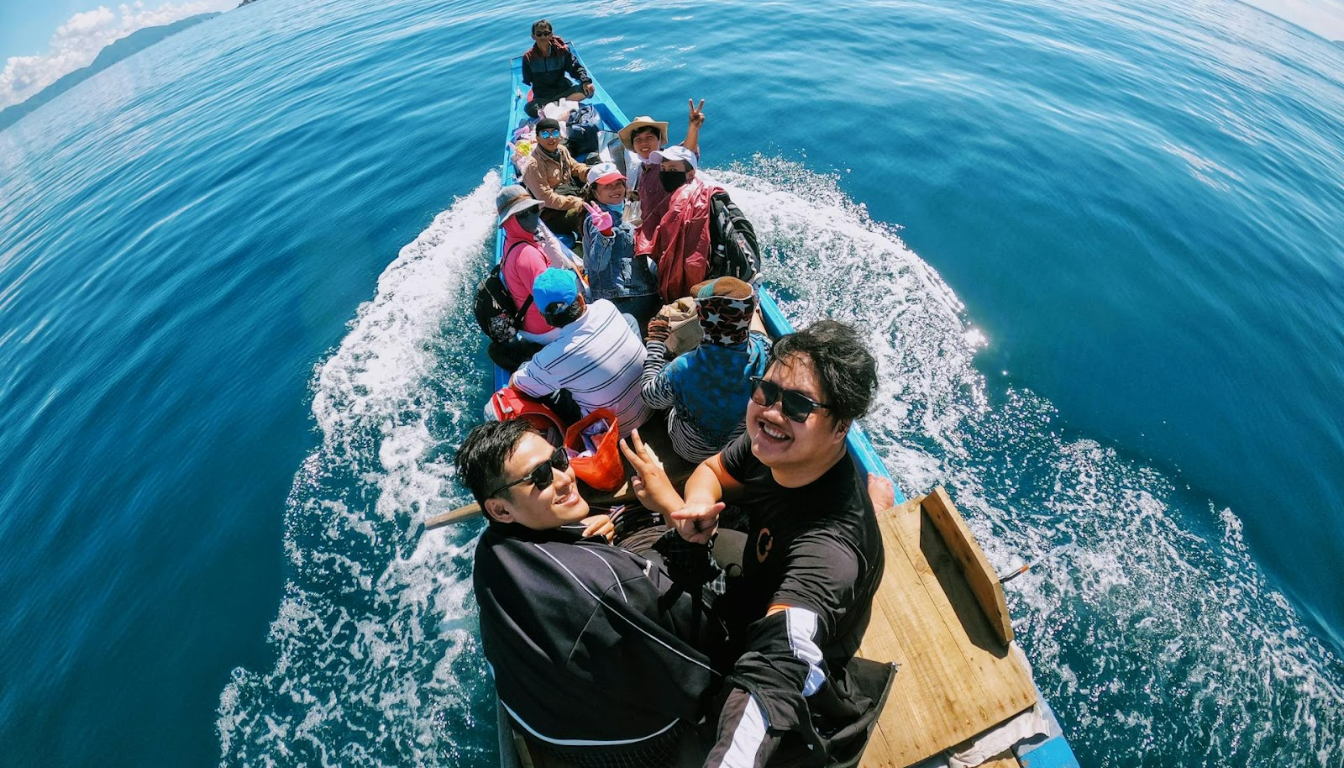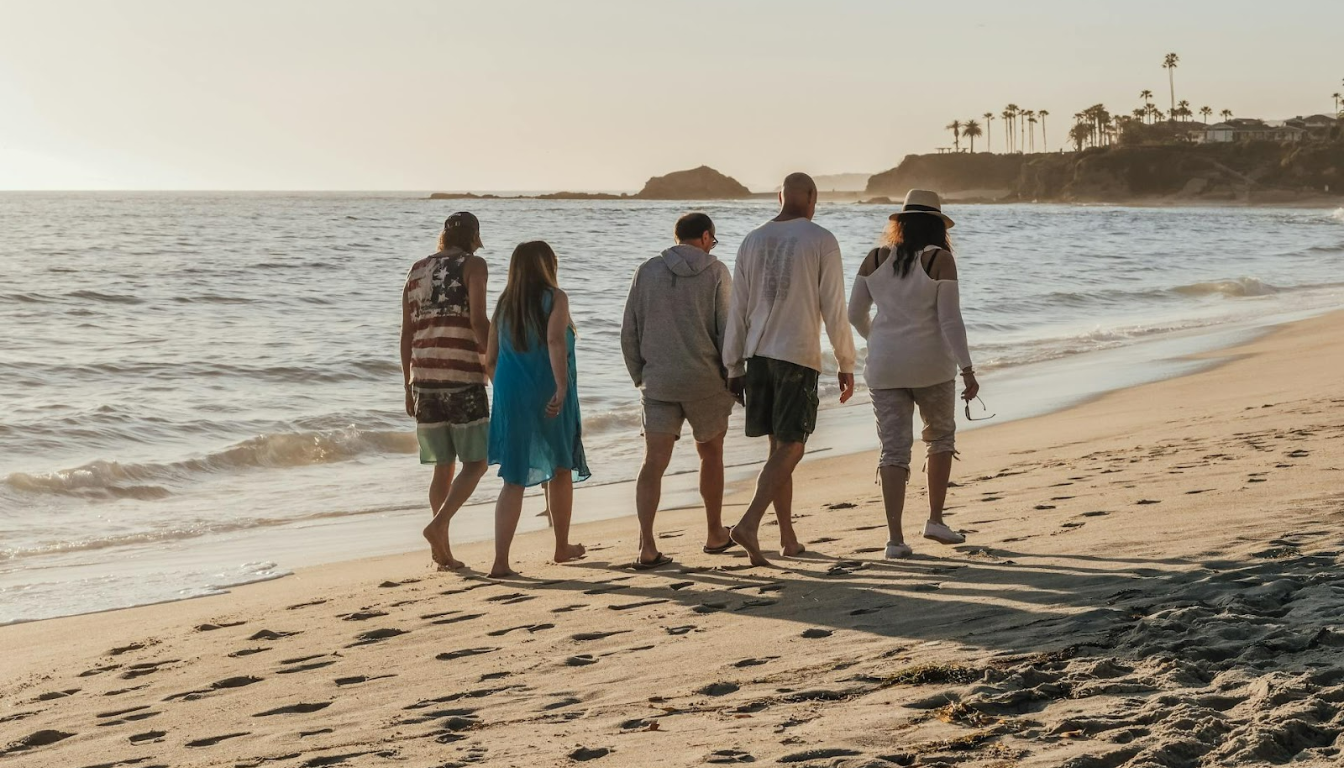Top 7 Inspiring Work Retreat Ideas to Boost Team Spirit

A work retreat is a structured getaway aimed at enhancing teamwork and boosting team spirit. It offers a break from the typical work environment to focus on strategic thinking and team bonding. This article will explore inspiring work retreat ideas, their benefits, types, and practical planning tips.
Key Takeaways
- Work retreats significantly enhance teamwork, communication, and morale by providing a break from the traditional work environment.
- Effective planning, including setting clear objectives and creating a balanced agenda, is crucial for maximizing the impact of a retreat.
- Utilizing platforms like Offsite simplifies the planning process by offering curated venues, exclusive savings, and comprehensive support for a successful retreat experience.
Understanding the Concept of a Work Retreat

A work retreat is a period spent away from the office, designed to enhance teamwork, foster relationships, and provide a refreshing break from the typical work environment. Unlike regular team meetings, company retreats focus on team bonding and morale by taking place in a relaxed, often inspiring setting.
The primary purpose of a work retreat is to achieve specific goals, whether it’s improving teamwork, increasing skills, or simply providing a space for relaxation and rejuvenation. These retreats can involve various groups within an organization, from executive leadership and specific departments to the entire company team.
Benefits of Work Retreats
Work retreats offer numerous benefits that significantly impact team dynamics and overall productivity:
- Improve teamwork and motivation by fostering a sense of community among employees through shared experiences and activities.
- Boost morale and emotional health by spending time outdoors.
- Promote open communication and reduce stress.
- Enhance collaboration, communication, and problem-solving, which are vital for achieving strategic objectives.
- Blend relaxation with productivity, helping to reduce employee burnout and improve overall well-being.
One-day retreats can have a lasting positive impact on employee engagement, leadership development, and team spirit. Activities such as fishing, hiking, and even walking in nature can foster good communication and unity among team members.
The blend of relaxation and focused work sessions during retreats allows teams to engage in strategic thinking and brainstorming sessions, ultimately leading to increased productivity and creativity. The return on investment (ROI) for retreats can be measured by comparing the costs to the improvements in team productivity and morale.
Types of Work Retreats
There are various types of work retreats, each catering to different needs and preferences. In-person retreats are particularly effective for team-building activities because they enable direct interaction and meaningful connections among team members. These retreats often involve exercises and activities that promote teamwork, such as creative workshops, brainstorming sessions, and collaborative problem-solving exercises. In-person retreats create an environment where team bonding can flourish, providing a break from the typical work environment.
Hybrid retreats, on the other hand, combine physical and virtual elements, allowing for flexibility and inclusivity, especially for remote teams. This type of retreat ensures that all team members, regardless of their location, can participate and contribute to the retreat experience.
Hybrid retreats are particularly useful in maintaining team cohesion in today’s increasingly remote work environment. Whether it’s a one-day retreat or a multi-day event, choosing the right type of retreat that aligns with your company’s needs and objectives is crucial for a successful retreat.
Planning an Effective Work Retreat

Planning a successful company retreat requires thoughtful planning and attention to detail. The key elements include:
- Setting clear objectives
- Choosing the right venue
- Creating a balanced corporate retreat agenda that combines productive activities with opportunities for relaxation and team bonding. Corporate retreat ideas can enhance the overall experience. Effective communication throughout the retreat ensures that everyone is informed and engaged, fostering a collaborative environment.
Additionally, selecting a venue that resonates with the retreat’s theme and goals can significantly influence team dynamics and the overall retreat experience.
Setting Clear Objectives
Defining clear company objectives at the outset is crucial for ensuring a productive and meaningful retreat experience. The primary aim of corporate retreats is to foster meaningful discussions, strong interpersonal connections, and strategic thinking. Executives should blend activities with purposeful meetings and ensure adequate free time for team bonding. A successful company retreat is characterized by clear objectives, engaging activities, a balanced schedule, and alignment with company values. Establishing specific objectives before the retreat helps in accurately assessing its outcomes and ensuring that the retreat meets its intended goals.
Clear objectives and understanding team dynamics can make a retreat memorable and impactful. Whether the goal is to improve communication, enhance problem-solving skills, or align on strategic planning, having a clear purpose helps in designing an agenda that meets the specific needs of the team, fostering critical thinking.
This thoughtful planning ensures that the retreat is not only enjoyable but also productive and aligned with the company’s long-term objectives.
Choosing the Right Venue
The location chosen for a corporate retreat significantly influences the atmosphere and overall success of the event. Important considerations for the venue include:
- Accessibility and suitable amenities to foster a productive and enjoyable retreat experience.
- Alignment with the retreat’s goals, whether it’s a conference room in a city hotel or a remote lodge in the mountains.
- Providing an environment conducive to relaxation and team bonding.
- Encouraging exploration and offering activities such as nature walks or outdoor adventures to promote fresh air and engagement with nature.
Offsite simplifies the venue selection process by offering a wide selection of vetted venues with substantial discounts, enhancing the retreat experience. Clients can browse thousands of specially selected venues that come with substantial discounts, making it easier to find a location that aligns with the retreat’s theme and objectives.
Offsite’s planning service covers all aspects of a retreat, from venue selection and catering to agenda creation, ensuring a seamless experience from initial planning to final execution.
Creating a Balanced Agenda
An effective corporate retreat agenda balances structured activities with ample downtime to ensure a fulfilling retreat experience. Defining the purpose of the retreat helps in designing an agenda that meets specific team needs.
Balancing structured activities with downtime allows for spontaneous team-building opportunities and keeps participants engaged and refreshed. This balanced approach promotes strategic thinking and healthy competition while providing time for relaxation and informal interactions.
Inspiring Work Retreat Ideas

Looking for innovative ideas to make your next retreat unforgettable? Here are some inspiring company retreat ideas that can boost team spirit and foster creativity:
- Outdoor adventure activities
- Wellness retreats
- Skill-building workshops
- Fun games
These ideas cater to various interests and objectives.
Whether you’re planning a one-day retreat or a multi-day event, these retreat ideas offer opportunities for team building, relaxation, and personal growth.
Outdoor Adventure Activities
Outdoor adventure activities are a fantastic way to promote team building and fresh air engagement. Activities such as:
- Hiking: Provides an opportunity for casual conversation in nature, allowing team members to connect on a personal level while enjoying the beauty of a local trail or park.
- Kayaking: Promotes teamwork as participants must coordinate their movements to navigate water routes successfully.
- Ropes courses: Require teamwork and coordination, fostering collaboration and trust among team members during a team building activity.
Other thrilling outdoor activities like zip-lining and standup paddleboarding can boost team morale and provide memorable experiences that enhance team bonding. When planning these activities, it’s essential to consider weather conditions and safety concerns to ensure a smooth and enjoyable retreat.
Outdoor adventure activities serve as powerful tools to encourage team bonding while promoting fresh air and engagement with nature.
Wellness and Relaxation Retreats
Wellness and relaxation retreats emphasize the importance of nurturing the mind, body, and spirit. They offer opportunities for individuals to unwind and rejuvenate. Morning yoga, afternoon meditation, and bonfire and stargazing sessions can improve concentration, manage emotions, and reduce stress. Spa treatments, personal reflection, and aromatherapy encourage employees to practice self-care and enhance their overall well-being.
A remote location with limited connectivity and wellness amenities can create a laid-back atmosphere that fosters relaxation and deeper connections among team members. The suggested duration for personal reflection time or meditation during a retreat is between a few hours and 30 to 60 minutes, allowing participants to fully engage in these activities and reap their benefits.
Wellness-focused retreats provide a perfect balance of relaxation and team bonding, making them an excellent choice for promoting mental health and well-being.
Skill-Building Workshops
Skill-building workshops are designed to improve job skills, promote leadership, and inspire creative thinking among team members. Activities such as a professional cooking class, cocktail-making workshops, and art classes like painting or pottery can boost morale, reduce stress, and enhance creativity. Cooking challenges, for example, promote outside-the-box thinking and teamwork as teams create meals with specific ingredients. These workshops provide an engaging way for team members to learn new skills and foster a sense of accomplishment and camaraderie.
Creative workshops, such as photography or digital art sessions, can further enhance team dynamics by encouraging creative problem-solving and collaboration. Participating in seminars focused on training and development can lead to increased profits and reduced turnover for the organization, as skilled team members bring valuable insights and knowledge back to their roles.
Skill-building workshops offer a unique blend of professional development and team bonding, making them an excellent addition to any retreat agenda.
Fun and Games
Incorporating fun and collaborative activities during a retreat strengthens team bonds and enhances relationships. Activities such as:
- Board game tournaments
- Scavenger hunts
- Escape rooms can foster friendly competition and team spirit.
- A themed movie night or a chili cook-off can promote interactive engagement and team camaraderie, providing a relaxed setting for team members to connect and unwind.
Engaging in fun and competitive games during a work retreat is crucial for boosting morale and enhancing team cohesion. These activities encourage creativity, healthy competition, and encourage friendly competition, promoting camaraderie, making them an essential part of a successful retreat.
Whether it’s a game of trivi, a scavenger hunt in a local park, an escape room challenge, board games, these fun and games activities provide a refreshing break from the typical work environment and create lasting memories for the team.
Enhancing Team Dynamics

Enhancing team dynamics is a crucial aspect of any company retreat. Activities that can significantly improve team cohesion and communication include:
- Icebreakers, which help individuals relax and prepare for collaborative tasks
- Small group discussions, which foster personalized interaction and deeper conversations
- Feedback sessions
Feedback sessions create an avenue for team members to express their thoughts and feelings about the retreat experience, encouraging open dialogue and continuous improvement. These activities collectively enhance team dynamics, making the retreat experience more impactful and meaningful.
Icebreaker Activities
Icebreaker activities are essential for creating a comfortable environment where team members can interact freely. These activities promote collaboration, quick thinking, and healthy competition, making them a great start to any retreat. Examples of effective icebreakers include volunteer days at a soup kitchen or shelter, which not only promote team bonding but also give back to the community.
Creative workshops like art classes can serve as icebreakers by fostering self-discovery and team bonding. These workshops unleash new ideas and encourage open communication, setting a positive tone for the rest of the retreat.
Icebreakers in your retreat agenda help ease tension and foster a sense of belonging among team members. Quick activities like scavenger hunts or collaborative art projects pave the way for deeper connections and smoother interactions throughout the retreat.
These activities are not just fun; they are vital for building a cohesive team dynamic from the get-go.
Small Group Discussions
Small group discussions are a powerful tool for enhancing team dynamics. These discussions foster personalized interaction and often lead to deeper conversations, allowing team members to share thoughts more freely and encourage conversation to build stronger connections.
Small groups enable participants to engage in intimate conversations, share insights comfortably, and foster a sense of community. This blend of personalized interaction and deeper conversations significantly enhances team dynamics and connections for the entire group, making it a valuable component of any successful company retreat.
Feedback Sessions
Feedback sessions create an avenue for team members to express their thoughts and feelings about the retreat experience. Gathering feedback allows organizations to identify what worked well and what needs improvement for future retreats. These sessions should be structured to encourage open dialogue, ensuring all voices are heard and valued.
Using feedback from previous retreats in the planning process enhances future retreats and better meets team expectations. Structured feedback sessions are crucial for continuous improvement and maintaining a high level of employee engagement.
Maximizing the Impact of Your Work Retreat

Maximizing the impact of your company retreat requires focusing on follow-up actions, measuring success, and continuous improvement. Creating an immersive retreat experience boosts morale and productivity, but the real value lies in the steps taken after the retreat.
A follow-up strategy helps ensure significant insights from the retreat are preserved and implemented, reinforcing key takeaways and maintaining momentum. By adopting these strategies, you can ensure your retreat has a lasting positive impact on your team and organization.
Post-Retreat Follow-Up
Incorporating feedback sessions throughout the retreat offers several benefits:
- Allows participants to voice their experiences and provides valuable insights for enhancing future events.
- Helps identify areas for improvement and builds stronger team dynamics.
- Provides immediate insights, allowing for adjustments that enhance the overall experience.
- Demonstrates that all voices are valued and considered in future planning, enhancing team relationships and fostering a culture of openness.
Success metrics for retreats can include employee morale, communication improvements, and the achievement of predefined objectives. Follow-up actions after the retreat are crucial for reinforcing key takeaways and maintaining momentum. By regularly gathering and acting on feedback, you can ensure continuous improvement and make each retreat more impactful than the last.
Measuring Success
The effectiveness of a retreat can be assessed through feedback mechanisms such as surveys and interviews, which gather quantitative and qualitative data. Surveys are an effective tool for collecting participant feedback post-retreat, providing a clear picture of overall effectiveness and satisfaction levels. Incorporating participant feedback into future planning can significantly enhance the value and effectiveness of subsequent retreats.
Regularly reviewing and updating retreat strategies based on participant insights is key to maintaining relevance and impact. Documenting lessons learned during the retreat is essential for continuous improvement efforts.
Continuous Improvement
The follow-up after the retreat highlights the main takeaways. It also emphasizes the commitments to continuous improvement. Collecting feedback after the retreat is crucial. It helps to recognize what was successful and spots areas that need enhancement.
A post-retreat plan should reinforce key takeaways and ensure action items are addressed, ensuring that the retreat’s positive impacts are sustained. This approach to continuous improvement helps your organization stay ahead of industry trends and fosters a culture of strategic thinking and innovation.
Simplifying Retreat Planning with Offsite
Planning a successful company retreat can be a daunting task, but Offsite simplifies the process by offering a platform to discover curated venues and vendors globally. Offsite helps organizations design seamless and engaging experiences for corporate retreats, ensuring that every event strengthens connection, collaboration, and culture.
With curated venues, exclusive savings, and end-to-end support, Offsite makes retreat planning a breeze, allowing you to focus on what truly matters – the success of your team.
Curated Venues and Vendors
Offsite curates venues, activities, and agendas that align with organizational goals for work retreats and team-building retreats. This curation process ensures that the selected venues and vendors enhance the overall retreat experience by meeting specific team objectives and fostering collaboration.
Offsite’s curated options, whether a local restaurant, conference room, or outdoor adventure site, provide the perfect setting to foster community through meaningful team interactions and growth.
Exclusive Savings
Offsite provides significant savings on accommodations, meeting spaces, and other retreat-related expenses. Users can benefit from:
- Discounts of up to 50% on various retreat-related services and venues through Offsite
- Pre-negotiated rates that can save clients substantial amounts
- Making high-quality retreats more affordable and accessible
Offsite partners with thousands of premier venues globally, securing discounts due to the business they bring, enhancing the value of each retreat.
End-to-End Support
Offsite offers end-to-end retreat planning services at a flat, per-person rate, providing:
- Expert guidance
- Streamlined planning process
- Management of accommodations
- Ensuring all event needs are met
Offsite makes the planning process hassle-free.
This comprehensive support ensures that every corporate retreat strengthens connection, collaboration, and company culture for the whole company, making it a valuable investment for any organization.
Summary
A well-planned company retreat can significantly boost team spirit, foster relationships, and enhance productivity. By understanding the concept of work retreats, planning effectively, and incorporating inspiring retreat ideas, you can create a successful retreat experience that meets your organization’s objectives. Enhancing team dynamics through icebreakers, small group discussions, and feedback sessions further enriches the retreat experience. With Offsite’s support in simplifying retreat planning, you can focus on what truly matters – the success and growth of your team. As you plan your next retreat, remember that the key to a successful retreat lies in thoughtful planning, continuous improvement, and a focus on team well-being and engagement.
FAQs
- What is the primary purpose of a work retreat?
The primary purpose of a work retreat is to foster relationships and improve teamwork while also enhancing skills and providing relaxation. It serves as a focused environment to achieve these specific goals.
- What are some examples of team-building activities for a work retreat?
Team-building activities like hiking, kayaking, ropes courses, morning yoga, cooking classes, and scavenger hunts can greatly enhance collaboration and camaraderie during your work retreat. Consider these engaging options to create a memorable experience for your team.
- How does Offsite simplify corporate retreat planning?
Offsite simplifies corporate retreat planning by providing a platform that connects you with curated venues and vendors worldwide, along with exclusive savings and comprehensive support throughout the planning process. This streamlined approach ensures a stress-free experience for organizing your retreat.
- Why are feedback sessions important in a work retreat?
Feedback sessions are crucial in a work retreat as they allow team members to voice their experiences and suggestions, leading to continuous improvement and more effective future retreats. This open communication fosters a collaborative environment and enhances overall team dynamics.
You may also like
Unique spaces for your next offsite
Find distinctive venues for your upcoming corporate retreat.
Stay Updated with Our Insights
Get exclusive content and valuable updates directly to you.







